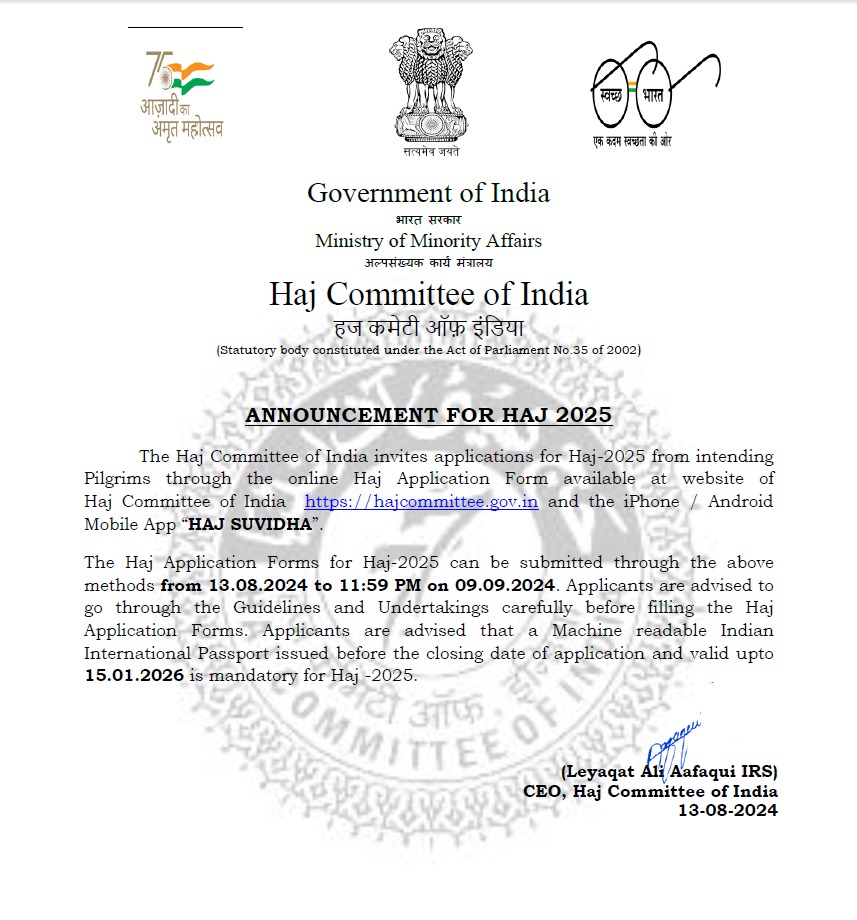5. (1) The Central Government will invite nominations from the Speaker of the House of the People and the Chairman of the Council of States, as the case may be, in respect of the three members specified in clause (i) of section 4, at least four months before the constitution or reconstitution of the Committee : Provided that if any member nominated under this sub-rule,- (a) ceases to be a member of the House of the People or, as the case may be,Council of States; or (b) becomes subject to any of the disqualifications specified in section 12, the Central Government shall invite fresh nominations from the Speaker of the House of the People or the Chairman of the Council of States , as the case may be. (2) The procedure for the election of the nine members of the Committee as mentioned in clause (ii) of section 4 shall be as follows, namely :- (a) (i) the meeting of the State Haj Committees in each zone shall be convened by the Central Government in New Delhi or in one of the State Capitals in the concerned zone; (ii) each meeting referred to in sub-clause (i) shall be presided over by an officer of the Central Government in the Ministry of External Affairs, not below the rank of an Under Secretary to that Government; (b) (i) the assembled members of the State Haj Committees of each zone shall elect one Muslim member from amongst themselves; (ii) the presiding officer referred to in sub-clause (ii) of clause (a) shall, at the end of the election process in each zone, certify the election of the member concerned and upon such certification the election of the member concerned shall be deemed to be final; (c) (i) the State Haj Committees of three States sending largest number of pilgrims during the last three years as specified by the Central Government, shall hold meetings for electing one member each from their respective States and the meeting shall be presided over by the Chairperson of the State Haj Committee or any member of the State Haj Committee nominated by him: Provided that where the Chairperson of the State Haj Committee is himself a candidate, the meeting shall be presided over by a member chosen by the members of the State Haj Committee present at the meeting. (ii) the assembled members of each such State Haj Committee shall elect one Muslim member from amongst themselves. (3) The State Haj Committee concerned shall pay the travelling and daily allowances to its members for attending the meetings for electing members under sub – rule (2). (4) (a) The Central Government in the Ministry of External Affairs shall nominate one officer not below the rank of the Joint Secretary serving in that Ministry as ex-officio member of the Committee as specified in clause ( iii ) of section 4. (b) The Ministry of External Affairs shall also request the Union Ministers of Home, Finance ( Department of Revenue) and Civil Aviation to nominate one officer each, not below the rank of the Joint Secretary serving in the respective Ministries, as ex- officio members of the Committee as specified in clause (iii) of section 4. (5) The Central Government shall nominate seven Muslim members from among the category of persons specified in sub – clauses (a),(b) and (c) of clause (iv) of section 4; (6) The Central Government shall endeavour to complete the process of elections and nominations under section 4 at least one month before the constitution or reconstitution of the Committee. (7) The Central Government shall fix, within a period of forty five days of the publication of the names of the members of the Committee under section 5, a date for the first meeting of the Committee , whose members shall , subject to the condition specified in the provision to sub – section (1) of section 7, elect the Chairperson and two Vice – Chairpersons. | 
